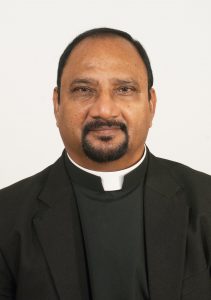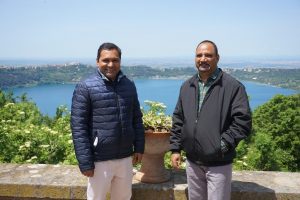
Dear Members and Readers,
The May-June issue of SEDOS Bulletin consists of the presentations delivered during the SEDOS Residential Seminar held at Casa Divin Maestro, Ariccia, from 6-10 May 2024. The theme which focused on, “Prophetic Witness for Universal Communion: Mission in Conflict Zones and Healing” was chosen after much discussion and deliberation. Forty-one members from 22 different congregations, actively participated in the seminar.
The notion of prophetic witness for universal communion stands as a beacon of hope and a call to action. This concept, rooted deeply in spiritual and religious traditions, emphasizes the mission of promoting peace, healing, and unity, even in the most troubled areas of the globe. By examining the role exercised by religious leaders and communities in conflict zones, we can understand how their efforts contribute to reconciliation and the broader mission of universal communion.
Prophetic witness refers to the act of living and voicing truth inspired by a higher moral and spiritual vision, often against prevailing injustices and adversities. This role is not confined to predicting the future but involves a profound commitment to justice, peace, and the common good. Prophets, in this context, are seen as voices that call for repentance, reconciliation, and the establishment of a more equitable and loving society.
The Conflict Zones, marked by violence, instability, and deep-seated animosities, offer unique challenges and opportunities for prophetic witness. Missionaries and missionary organizations are often at the forefront, where they mediate peace efforts and provide humanitarian aid.
Their mission in these areas involves:
1. Advocacy for Peace and Justice: We read of many prophets in the Old and New Testaments who sacrificed their lives fighting for truth and justice. Jesus always stood for truth and fought against all injustice and as a consequence he gave up his life. Missionaries are called to be prophets following their Master. In the present context we find many missionaries who stand up and do not care about the consequences. These ‘Prophets’ in conflict zones advocate for peace by addressing the root causes of violence, such as poverty, oppression, and discrimination. They engage in dialogue with the parties in conflict as they strive to break down barriers of mistrust and hostility.
2. Providing food, shelter and Support: Many missionaries and religious communities offer sanctuary to those displaced by conflict, providing food, shelter, and medical care. This act of compassion not only meets the immediate needs of the people but also fosters a sense of solidarity and shared humanity.
3. Promoting Interfaith Dialogue: We see that many missionaries become peace-makers by resolving the causes of conflict between diverse groups. In regions where religious differences fuel conflict, they try to promote interfaith dialogue. They take initiatives and create platforms for understanding and cooperation among various religious groups, emphasizing common values and mutual respect beyond their immediate differences.
4. Healing Trauma: Such trauma and conflict leave deep scars in the hearts and minds of the people who have experienced these dreadful events. We find many missionaries engaged in healing these deep psychological and emotional scars. Their prophetic mission includes the healing of trauma through counselling, spiritual guidance, and rituals that help individuals and communities to come to terms with their pain and find hope. The process of healing in conflict zones is complex and multifaceted. It involves
both immediate relief and long-term efforts to rebuild trust and harmony.
In such situations we, missionaries, are called to play a vital and prophetic role. We can motivate and strengthen the lives of the people who are suffering and help them to rebuild a society which values human lives and stands for peace and justice. We can facilitate truth and reconciliation by helping the communities to confront their past atrocities and seek forgiveness and reconciliation. We as prophetic leaders can help in creating a narrative of collective healing and future coexistence. We can initiate education for peace which is a cornerstone of long-term healing. There is a need for a curriculum that emphasizes peace, tolerance, and conflict resolution, to nurture a new generation committed to universal communion. Spiritual Renewal can also be a solace and give a sense of continuity to those affected by conflict.
A missionary, as a prophetic witness, can offer a vision of hope and renewal that transcends immediate suffering; empower local communities to take an active role in peace-building and ensure that the mission of healing and reconciliation is sustainable. This mission includes training in conflict resolution, leadership development, and economic initiatives that provide stability and reduce tensions.
Prophetic witness, for universal communion in conflict zones, is a powerful testament to the enduring human spirit and the quest for a more harmonious world. Through advocacy, sanctuary, dialogue, and healing, our mission can transcend individual differences and strive for the common good. We must recall that even in the darkest of times, the light of compassion, justice, and unity can shine through, and guide humanity towards a future of universal communion and peace.
The Welcome Address by Alain Mayama, CSSp, invites all missionaries to be prophets and prophetesses to can heal the victims of conflicts by asking the question: “What is our role as followers of Christ; as missionaries and what does being a mission Church in the context of violence and war involve?”
In the Keynote Address, entitled, “Temoignage Prophetique Pour la Communion Univerelle Mission Dans Les Zones de Conflits et Guerison”, Cardinal Dieudonné Nzapalainga, C.S.S.p, a religious missionary priest and Pastor (bishop) of the local Church, in the Archdiocese of Bangui, Central African Republic, shares his practical experience in areas torn by conflict, war and violence.
In the article, “Jesus, a model of non-violence”, Guy Theunis, M.Afr, presents the biblical foundation of the theme based on the ‘Sermon on the Mount’, found in Matthew’s Gospel (5: 38-42), and on Jesus’ own life.
Marie Dennis, in her article, “Gospel Nonviolence: A New Paradigm for the Mission”, calls upon all to work for true peace that is rooted in justice. According to her, true peace is not merely the absence of war, but the fullness of life for, all which is the Christian vocation. She says, “As followers of the One who is Peace, who on the Cross overcame the violence in our world, we are called to help move our broken and violated world toward the full flowering of the New Creation.”
The presentations “Mission in conflict zones and healing” by Pier Luigi Maccalli, SMA, and “Social Support as Means of Healing” by James Kulwa Shimbala, SMA, are personal and moving testimonies of their lived experience. I am sure these articles will enrich you, enlighten you and guide you on your missionary path.

John Paul Herman SVD
Director of SEDOS


